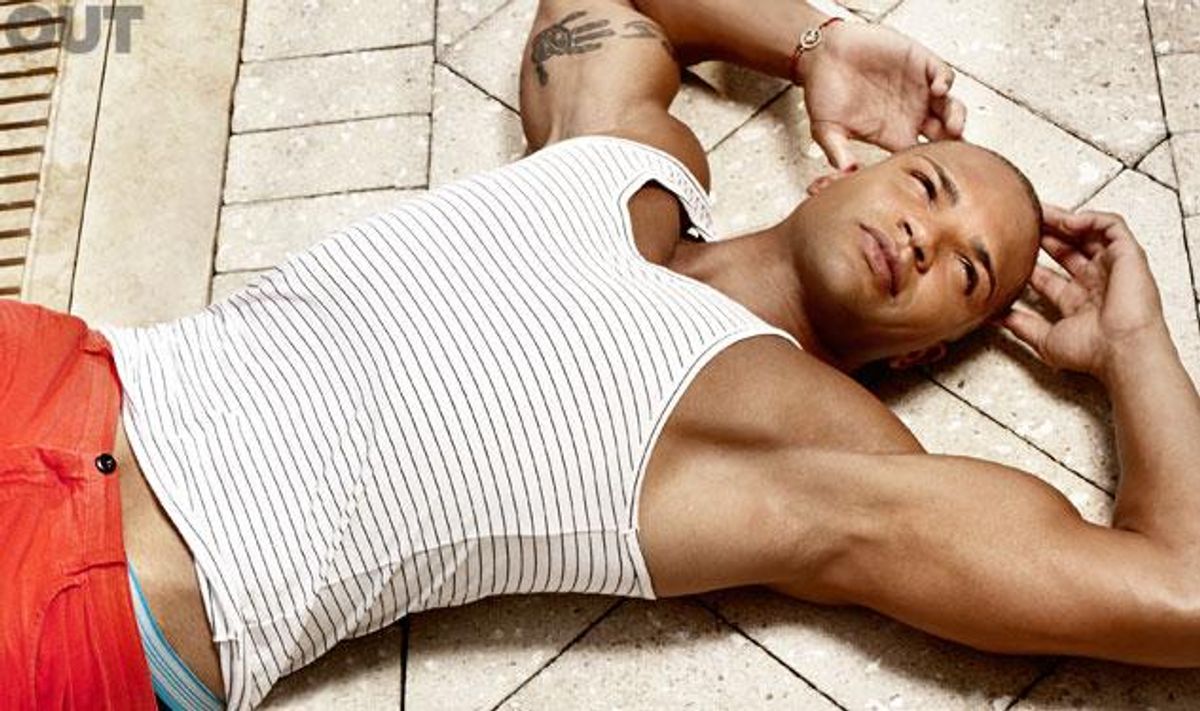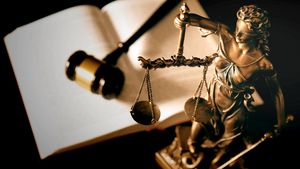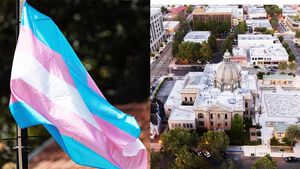 Photography by Roger Erickson
Photography by Roger Erickson
Chris Kluwe and Brendon Ayanbadejo. They're straight. They're NFL players. And they call themselves athlete allies. It's been nearly a year since Kluwe, then a punter for the Minnesota Vikings, penned a powerful and profanity-laden missive in support of Baltimore Raven Ayanbadejo. The open letter, published on sports website Deadspin, was addressed to Maryland delegate Emmett C. Burns Jr., who had written to the Ravens's owner essentially asking him to muzzle Ayanbadejo's support of a marriage equality bill. The 772-word piece, in which Kluwe (who has a gay brother-in-law) assured Burns that gay marriage in America would not "magically turn you into a lustful cockmonster," went viral, eventually landed him on The Colbert Report, and made him, along with Ayanbadejo, one of the lead voices and activists in the ally movement.
In the months that have followed, both Ayanbadejo and Kluwe have become even more active in the fight for equality, from making robocalls to Illinois residents, to co-filing an amicus brief with the Supreme Court on the challenge to California's Prop 8, to marching in gay pride parades this spring. Their vocal activism, as well as NBA center Jason Collins's coming out -- he's the first male athlete active in one of the big four professional sports to do so -- are hopeful signs of change in the culture of pro sports. Ayanbadejo, 36, won a Super Bowl this winter, before both men were released by their respective teams. Kluwe, 31, fought for and secured a roster spot on the Oakland Raiders this May; Ayanbadejo will graduate with an MBA from George Washington University this summer and is actively considering new career options. The two men spoke with Amy K. Nelson about their roles as straight allies, whether their activism is translating to actionable items, how their worlds have changed now that they're ambassadors to the LGBT community, and what needs to happen next.
Amy K. Nelson: We're three straight people talking about LGBT issues. I mention this because both of you have been huge faces for your portion of the straight athlete ally movement. You obviously interact with so many people in the LGBT community. What has it been like for you now that you're more ensconced in this world?
Chris Kluwe: For me, it's mainly been people coming up and saying, "Thank you; thank you for speaking out, thank you for having a voice." While I'm grateful for that, it's also kind of depressing, that someone has to thank someone else for speaking out for their essential human rights. I mean, gay people are people just like anybody else... There are great people in the LGBTQ community and there are bad people in the LGBTQ community, just like there are great people and bad people everywhere else. It's humanity.
Brendon Ayanbadejo: I think the coolest thing was [when] a gay couple was getting married in Tahiti and wanted to fly me out there to be at their wedding -- I thought that was awesome. I thought that was a good gesture. Every day on Instagram and Twitter and Facebook, guys ask me to marry them--
AKN: Would you ever take them up on it, Brendon?
CK: Very snappily.
BA: It's flattering -- of course it's joking, but the most flattering one is: "This large gay woman would take you any day." When I get those messages, I kind of like them. I'm always with my wife and I'm like, "Look, other girls do like me." But I think, at the end of the day, the most special thing is when a mother or a gay person comes up to you and just thanks you and calls you a hero. They say I'm a hero, but I'm just a concerned citizen and I'm just doing the right thing.
I don't know about Chris, but we'll see what happens after my photo shoot -- I've seen some of Chris's pictures, and I had a little twinkle in my eye after I saw them. I don't know, maybe I'll get some more proposals from more women and gay men.
SLIDESHOW: See More EXCLUSIVE Brendon Ayanbadejo PHOTOS

AKN: What did you think of Chris's photo shoot [for the November 2012 cover story of Out]?
BA: I know he's got this one shot where it looks like he's in a field and his hair is blowing in the wind; he definitely looks like a model.
CK: My wife requested I be shirtless in my photos, so...
BA: It was a great picture. I can respect the art of the picture and the subject and the camera work that goes into it. I hope they all turn out that good.
AKN: Has another man ever asked you to blow him?
BA: Let's put it this way: The straight women are more aggressive than the gay men. They say a lot more ridiculous things than a gay man would say on social media.
Whatever the guys say, I know a lot of it is joking -- just being fun, flirting -- whereas a woman will go way out there and say some crazy stuff. If I replied to a woman saying that kind of stuff, my wife wouldn't appreciate it. So to the guys, I'll say, "Maybe in another life," or something else, joking around. It's never gone that far.
I think people respect that we're willing to have the LGBT community's back and they don't want to cross that line. They understand that we're straight allies.
CK: Same thing as with Brendon; I'll get funny messages from people, but it's...whatever. People will say things [on the Internet] that they would never say to your face in real life. The key is just to be comfortable with who you are. I'm happily married to my wife, so you just laugh at it and give a funny response--that's what people are looking for.
AKN: Both of you have had to answer so many questions about whether your activism was the cause of your unemployment. Why do you think that comes up so much?
CK: Brendon and I were in the news quite a bit for our work trying to fight for marriage equality; I think that's just something that can be looked at, to say, "Hey, are they focused completely on football?" Brendon won a Super Bowl, so I think he's pretty focused on football. It's just one of those things we have to deal with in our society.
BA: Everybody likes to think of a conspiracy theory. I'm part of the conspiracy, I guess, for Chris. It makes me scratch my head a bit -- for Chris, he's the same player he's been throughout his career, the leader in punting history for the Vikings, so the timing is kind of odd.
AKN: Around the NFL, there's been a lot of advancement in the discourse around this issue, even in the last year -- it's shifted a lot. But what team in the league do you consider the least embracing of this issue?
CK: I don't know, because I haven't been with every team--I don't think you can single out a team to say, "This is the worst team" or "This is the best team," because they're composed of a variety of individuals. It's just like society.
BA: I think you have to look at which teams do embrace it, instead of which teams don't embrace it. Teams that don't embrace it, they're just silent, but the teams that do embrace it, they make an imprint. The San Francisco 49ers, the Baltimore Ravens, the New York Giants -- they have some sort of tie to the LGBTQ community. The teams that are quiet -- why are they quiet? Is it because they don't accept the community, or is it because they haven't had the chance to make themselves be seen? When Jason Collins came out, you saw the entire MLB endorse him. You saw various teams in the NBA endorse him, but you didn't hear much from the NFL -- [they] definitely have some work to do.
SLIDESHOW: See More EXCLUSIVE Brendon Ayanbadejo PHOTOS
AKN: Even before this was more publicly talked about, did you feel that there were owners and/or teams that were either not embracing the LGBTQ community or were potentially discriminatory?
BA: I've heard it from different people and different organizations, whether they're coaches or pastors or even players on other teams. This was several years ago; now the talk is completely different, the tone is completely different.
CK: I think it's really just a matter of education. Where a lot of guys would, as Brendon said, kind of just unthinkingly say whatever they had been taught. Now you actually have guys who stop and think and realize, Hey, I have a family member who may be gay, and this will have a real impact on their life. It's a welcome change, and I think it's the way our society is moving toward having more personal freedom, having more control over your life rather than less.

AKN: You've been interviewed so many times on this subject, and the word "tolerance" keeps coming up. But how do you gauge how you talk about words and dialogue and discourse versus what's next--what's next in terms of something actionable?
BA: First of all, I think about legislation and changing the laws. In 29 states you can still be fired if you're part of the LGBTQ community, and that's pretty outlandish. We talk about action -- when we start looking on homophobia the same way we look at racism, we've done our jobs. Also, if suicide rates change -- you know, with kids who are being bullied, who don't feel like they're good enough, or are being ridiculed for being who they are--then we've done our job and we've taken action. And society-wise, [there's] physical acceptance; if you see a family, if you see two men walking down the street and you see them kiss, it's not a big deal. You talk about taking action--those are the type of things we're trying to change.
CK: You have to say something if you see it happening. If a guy is using a homophobic slur or saying something wrong, you have to point that out -- you don't have to be rude about it, but you can say, "Hey, there are different ways to express yourself. Just because someone lives their life a certain way doesn't give you the right to control their life for them."
BA: Yes, it's important to simply say, "Hey, you can't say that word" or "You shouldn't say that word because it's no different than saying the n-word or a derogatory racial slur." It's the exact same thing if you call someone a "f****t" or call somebody gay, if you call someone queer, sissy. It could be all that stuff... I'm taking those words out of my vocabulary, but I think I need to start saying them more for shock value. I'm going to start talking at high schools, and I'm trying to debate what would be better: to say those words so they hear them, or say "derogatory homophobic words?"
AKN: Do you think instituting fines for guys on teams if they use those words would be effective?
BA: No, I don't like that idea. If it happens in a football game and they're talking to a ref and they say something on TV, then, yeah, you should be fined just as everybody else is fined, but a lot of this stuff is just talking. In the locker room, in meetings, even coaches -- certain people just talk like that. You saw that the coach from Rutgers [Mike Rice] was rampant about it; he did it all the time. I think you don't want to scare people. You want them to embrace it because it's the right thing to do, not because, "Oh, I'm going to get fined now."
CK: I think another important thing to look at is that guys don't come into the NFL as blank slates; they learn as they grow up in society. To start fining guys in the NFL is the wrong way to go about it. What we should be looking at is how kids are being taught in our schools--what are they being taught to value? There are a lot fewer incidences of homophobia happening with the younger generation--there's a lot of work to be done, but I think it's definitely more a societal issue than a sports issue.
AKN: Did you have gay and lesbian friends before this? How has your view of the culture changed since you've been much more active with this cause?
CK: I've never really been that curious [about friends' orientations]. I don't really care, as long as they'll play video games with me -- that's pretty much the only thing I'm looking for in a friend. For me, it boils down to: Are you free to live your own life? That's something I would like all my friends to have, and something I would like everyone to have: The choice to make your own decisions in life.
BA: I spent a little bit of time in an LGBT dorm when I was a young kid... it makes a big difference when you get to hang around with the LGBTQ community. I didn't see them as any different, even though they kind of had this label: "We live in the LGBT dorm." It wasn't that big a deal to me, but people were amazed that back in the '90s I was living in that type of environment. That kind of developed who I was as a young person, and followed into my adulthood.
AKN: You two are tied together by this issue; you have become the faces for straight athlete allies. Bottom line: Why can't you guys just marry each other already?
BA:[Both men laugh] Maybe in another life.
CK: In another life.
SLIDESHOW: See More EXCLUSIVE Brendon Ayanbadejo PHOTOS




 Photography by Roger Erickson
Photography by Roger Erickson






















































































